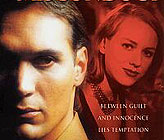|
|
|
|
Gross
Misconduct
|
 |
|
With George Miller's Gross Misconduct – that's not the Mad Max Miller but the Man From Snowy River (1982) guy – we are hurled into the realm of the chaotic, free-for-all erotic thriller. A truly international genre, and one especially popular in the video market. Gross Misconduct incorporates a murder mystery, a courtroom drama and a psychological exploration of aberrant behaviour. Inevitably, it owes something to the Hitchcockian legacy – but not so much to Hitchcock's own works as the more contemporary, kinetic, postmodern reworkings of such narrative models in the films of Brian De Palma and Dario Argento. In particular, Gross Misconduct shares with these contemporary thrillers a wilful, even paranoiac tendency to strike out in every direction, hinting that every character who walks through a door may be the person most likely to have committed the foulest imaginable crime. All it takes is a single cutaway to a sinister look or a mysterious gesture to make even the seemingly most innocent character seem suspicious ... The plot hook here is the contemporary debate over sexual harassment and intimate relations between teachers and students in the tertiary arena, about which such prominent Australian literary figures as Helen Garner and Cassandra Pybus wrote during the '90s. Justin (Jimmy Smits) lectures on the Greek philosophy of love and Jennifer (an early role for Naomi Watts) goes out of her mind with desire. After their sexual liaison takes place, Jennifer experiences an (unseen) violent incident and becomes amnesiac – thus pegging Justin as the prime suspect. Miller evoked the politically incorrect terrain of the modern thriller – its exploration of taboo topics and supposedly dangerous desires – when he referred in an interview on SBS' The Movie Show to the "hot, sexy" nature of his subject matter. But as soon as Miller and his writers approach the white-hot centre of this situation, the film becomes a crazy mess of innuendo, murder and perversion. The hysteria of the film prompted a like emotion in at least one reviewer (Peter Castaldi on the ABC TV program Review) who wildly castigated the film for exploiting unseemly fantasies of "incest and child abuse". One should perhaps not be so quick, however, to dismiss the film's broaching of the teacher-student taboo, since it is a recurring and even obsessive theme in Australian film and television, from Fast Talking (1984) to The Heartbreak Kid (1993) and Heartbreak High. Gross Misconduct is indeed a strange and trashy artefact, which makes for curious, sometimes inadvertently hilarious viewing. Part of the discomfort of the film arises from the way Miller attempts to integrate into the general atmosphere of perversity and degradation a decent, old-fashioned human story of a marriage tested and fortified: somewhat unbelievably, Justin's wife Laura (Sarah Chadwick) accepts him back after earlier throwing him out upon hearing of his teacherly infidelity. The film is styled like a telemovie, and decked out with many familiar faces from television. Most notably, it is one of those queerly located, mid-Pacific movies which so many Australian critics love to hate – a mélange of American accents real and faked vying for attention with a touristic parade of local Aussie sites. A number of these were made in Australia during the '90s (such as the Cynthia Rothrock action film Irresistible Force [1993]), and most were modest, generic efforts which disappeared to video without comment. Gross Misconduct suffered the misfortune of being plucked out of the pack and berated as a vulgar mistake, an exemplar of the kind of the film we should not be making in Australia. But, as a typical erotic thriller, it is no better and certainly no worse than a hundred similar titles from anywhere around the world. MORE George Snowy Miller: Andre, Les Patterson Saves the World © Adrian Martin December 1994 |
![]()